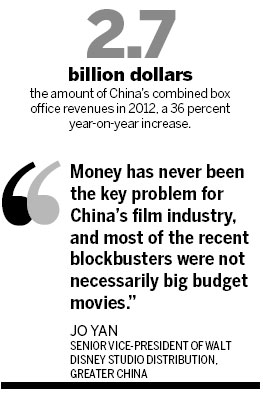Problems still hindering growth of film industry
Updated: 2013-06-18 07:23
By Wu Yiyao and Yu Ran in Shanghai (China Daily)
|
||||||||
Weak IPR protection, lack of communication between investors and filmmakers cited as barriers to success
Despite rapid growth, the Chinese film industry still faces some nagging problems that industry experts say must be resolved before it moves on to the next level of its development.
Zhang Tian, the general manager of Shanghai's Culture Assets and Equity Exchange - the first pilot program backed by the central government for cultural enterprises to trade copyrights and equities - told a film and TV finance workshop this week that inadequacies in intellectual property right protection, in particular, have continued to cloud the industry.
What's more, Zhang said the lack of a formal channel for closer communication between filmmakers and investors has blocked the flow of investment money into the industry.
"More financing products, tools, and trading measures would help investors and film makers to make better use of various resources, and the exploration of further financing models would benefit the industry in the long run," added Zhang.
These issues aside, however, China's film-making market has been growing fast since 2010.

The country's combined box office revenues reached $2.7 billion in 2012, a 36 percent year-on-year increase.
It is now the world's second-largest film market just behind the United States, and the world's third-largest filmmaker, according to the Motion Picture Association.
"China, and especially Shanghai, continues to be a popular backdrop and facility for both local and foreign film productions," said Rance Pow, the president of Artisan Gateway, a leading film and cinema industry consulting firm, at the launch of a report on the economic contribution of the Shanghai film and television industry.
His company was commissioned by the US Consulate in Shanghai to release the study.
Pow added that it is essential to ensure that intellectual property rights are protected before considering how to raise film investment and make money out of any movie projects.
Funding for filmmaking and television production has also been expanding.
According to data from the Culture Assets and Equity Exchange, China now has 18 funds that specialize in filmmaking and TV investment, worth a combined total of more than 19 billion yuan ($3.01 billion).
Copyright evaluation and risk management for lenders, as well as intellectual property right breaches have also become major obstacles for the growth of China's filmmaking industry, and investors, under certain circumstances, may see filmmaking as a risky area, according to Zhang.
Michael Ellis, president and managing director of the Motion Picture Association, Asia Pacific, said establishing market conditions which make it attractive for sustainable theatrical and non-theatrical returns will benefit China's filmmaking industry.
While around three-quarters of film revenue in the US comes from non-theatrical channels such as theme parks, hotels and comic products, in China only about 10 percent of total film revenue is generated outside of theaters, which means China is yet to fully exploit that side of the industry, said Ellis.
A recent report jointly commissioned by the China Film Distributors & Exhibitors Association and the Motion Picture Association estimated that China's total income from DVD, Blue-ray, and VCD sales and rentals in 2011 reached just over 350 million yuan.
Estimates suggest Shanghai's home entertainment market potential ranges between 140 million yuan and 152 million yuan.
Jo Yan, senior vice-president of Walt Disney Studio Distribution, Greater China, emphasized that in China, it is not so much about how much is invested, but about the story.
"Money has never been the key problem for China's film industry, and most of the recent blockbusters were not necessarily big budget movies," he said.
He added that the Chinese digital market is growing and consolidating and that he expected it to be very profitable in future for local film producers.
In 2012, the total number of cinema screens in China grew to over 13,000 nationally after 3,832 were added during the year - an average of 10.5 new screens per day. About 91.5 percent of screens are 2K digital projection installations, and most are 3D capable.
Yu Dong, chairman and chief executive officer of Bona Film Group Ltd, said that in five years he expects China to have a filmmaking industry worth $10 billion.
But he added: "It is essential to make reforms to current filmmaking industry policies. Filmmakers need to improve product quality, and policy makers need to introduce a film rating system."
Contact the writers at wuyiyao@chinadaily.com.cn and yuran@chinadaily.com.cn.
(China Daily USA 06/18/2013 page14)

 Michelle lays roses at site along Berlin Wall
Michelle lays roses at site along Berlin Wall
 Historic space lecture in Tiangong-1 commences
Historic space lecture in Tiangong-1 commences
 'Sopranos' Star James Gandolfini dead at 51
'Sopranos' Star James Gandolfini dead at 51
 UN: Number of refugees hits 18-year high
UN: Number of refugees hits 18-year high
 Slide: Jet exercises from aircraft carrier
Slide: Jet exercises from aircraft carrier
 Talks establish fishery hotline
Talks establish fishery hotline
 Foreign buyers eye Chinese drones
Foreign buyers eye Chinese drones
 UN chief hails China's peacekeepers
UN chief hails China's peacekeepers
Most Viewed
Editor's Picks

|

|

|

|

|

|
Today's Top News
Shenzhou X astronaut gives lecture today
US told to reassess duties on Chinese paper
Chinese seek greater share of satellite market
Russia rejects Obama's nuke cut proposal
US immigration bill sees Senate breakthrough
Brazilian cities revoke fare hikes
Moody's warns on China's local govt debt
Air quality in major cities drops in May
US Weekly

|

|







